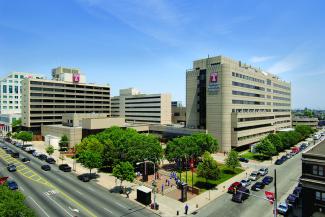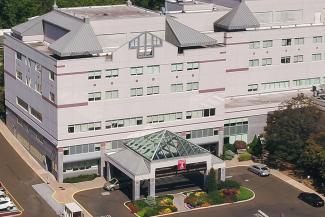Temple Health urologists are highly skilled and experienced in both minimally invasive robotic-assisted and open prostate surgery (prostatectomy), including radical prostatectomy to remove prostate cancer.
A prostatectomy is a procedure that involves the total surgical removal of both the prostate gland and seminal vesicle. It is used to cure prostate cancer that is localized to the prostate.
A physician typically recommends radical prostatectomy if cancer is found in more than one part of the prostate. Removing the entire prostate gland makes the cancer less likely to return. This procedure also allows your medical team to confirm the stage of the tumor, which can help determine additional treatment options if necessary.
Our urologists perform several types of prostate surgeries, including:
- Open prostatectomy – Also called traditional surgery, this is a less-common procedure in which your surgeon makes an incision underneath the navel to access the prostate. Because this is a major abdominal surgery, it requires a longer recovery than minimally invasive procedures.
- Robotic-assisted laparoscopic prostatectomy – During this procedure, a surgeon uses the DaVinci® robotic interface to make small incisions and perform the surgery with more control, sparing nearby nerves and tissue. More than 80 percent of prostatectomies are performed robotically and this procedure yields similar or better outcomes than traditional open surgery. With smaller incisions, most patients have quicker recovery times, less blood loss and shorter hospital stays.
- Robotic salvage prostatectomy – This procedure is for men who have had prior external beam radiation therapy, brachytherapy, cryoablation or High Intensity Focused Ultrasound (HIFU) for prostate cancer and the cancer has persisted or recurred. Because these prior therapies can drastically scar the prostate and surrounding area, removing the prostate becomes much more complicated and risky. By using a robotic surgical interface, an experienced robotic surgeon can utilize the better visualization and precise robotic controls to minimize complication risks and successfully perform a more complicated surgery.
Prostatectomy Recovery
After a prostatectomy, you can expect to stay in the hospital typically for one to two days and be out of work for a few weeks. Side effects of incontinence and erectile dysfunction are highly variable depending on multiple factors; so always discuss them with your physician.
An Individualized Approach
At Temple Health, our experienced urologists help patients determine the right management option for their needs. We assess the grade and stage of your prostate cancer and your overall health to determine the right treatment approach for you. For those who are appropriate for surgical management, most are candidates for robotic surgery.
Our surgeons are regional leaders, using robotic technology to improve surgical outcomes for prostate cancer patients. If you are not an ideal candidate for a robotic, minimally invasive surgery, our surgeons may recommend observation, active surveillance, radiation or a traditional open prostatectomy procedure.
After surgery, your prostate tissue is assessed by Temple Health’s world-class pathologists, who can determine the stage of prostate cancer, helping your team determine the appropriate next steps in your treatment, such as hormone therapy, radiation therapy or chemotherapy.
Ready for an Appointment?
Find a doctor near you, request an appointment, or call 800-TEMPLE-MED (800-836-7536) today.


